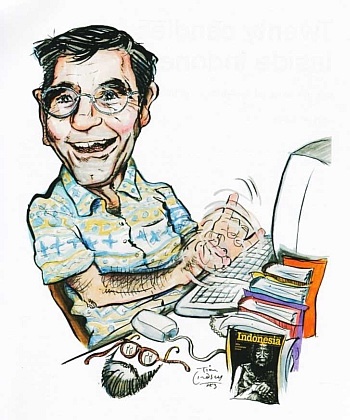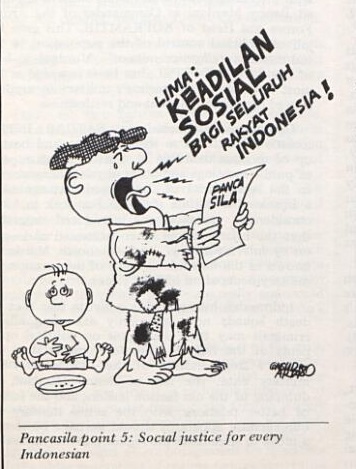Jemma Purdey anD Gerry van Klinken
Forty years is almost unheard of for a little magazine like ours. This is a good moment to look back; an even better one to look forward.
Inside Indonesia was set up by a group of Australians to respond with international solidarity to Indonesian poverty, inequality and authoritarianism. Today, Indonesia is prosperous, democratic and international, while Australia has arguably become more parochial and conservative. So, what are we still doing here? That’s what we asked all the authors in this bumper edition. They have been part of the mag for years – the ‘veterans’ for decades.
People-to-people solidarity was the key from the beginning. What new meanings might we attribute to that mission today? The founders highlighted politics and society, environment, arts and culture, religion, and human rights. Are these themes still relevant? What new questions have emerged needing attention?
Pat Walsh is a veteran - the veteran! His 2007 account (republished here) of the ‘audacious’ venture they conceived in Melbourne in 1982 pulses with an urgency to wake up Australians to the potential of people-to-people relations with their northern neighbour. The magazine even scored a few scoops, as Pat explains while leafing through old editions. Helen Pausacker recalls the comradely mailouts by volunteers in the old paper days. Barbara Hatley, another veteran, is clearly proud of the unique way the magazine has long interpreted Indonesian theatre to the world. And Keith Foulcher recalls how Inside Indonesia stood with Indonesian writers through the dark days of New Order authoritarianism, until light began to break through in 1998.

Some of our younger authors say the original inspiration remains worthwhile, perhaps more than ever. Lis Kramer wants II to continue to be a free, well-informed, popular, non-‘monetised’ medium that crosses boundaries. Such voices are under threat in much of the world from big-tech platforms and monopoly capitalist mass media.
‘Well-informed’ is still the goal too, but somehow also a dilemma. Kramer feels being a foreign expert holding forth on Indonesia without living there invites ‘a minor existential crisis’ within her: ‘What right do I have to comment on what happens in Indonesia when the politics don’t directly affect me?’ Pam Allen – another veteran - turns it around and worries about the Australian expert expatiating on Indonesia to an Australian audience, but who isn’t heard because, well, they are too ‘expert.’ She wants more surfers and filmmakers to write for II.
The strongest aspiration to still resonate is to have more Indonesian writers. This has now actually happened. Unlike the 1980s, our audience and most of our contributors reside overwhelmingly inside Indonesia. Australians and indeed those in 'the West', make up a very small portion of both. The most insistent voice urging us to take this even further is Annisa Beta’s. She wants Indonesian youth to have more space in the magazine to share their defiant, revolutionary ideas. And ‘with minimal mediation by older adults’, she adds.

Krishna Sen explains why having Indonesians fill the mag’s online pages is so important. She helped found the magazine after arriving in Australia from India. Where India was once the only democracy in Asia, Indonesia is now doing better than Modi’s India. Indonesians have something to say that the rest of the world needs to hear. That crossing of boundaries from inside to out is perhaps what II can now do better than the other expert forums out there.
The most radical suggestion for change comes from Andy Fuller. As the world moves into the Anthropocene with its climate crisis created by the prosperous West, perhaps the very basis from which we once viewed the international order needs to change. As Naomi Klein once wrote, 'This Changes Everything'. Indonesians, Australians, Dutch – all must learn from each other how we try to live in our own little ecological niche with some love and justice.
We'd love to hear what you think. Feel free to get in touch with us on our email (editor@insideindonesia.org).
Jemma Purdey (editor@insideindonesia.org) and Gerry van Klinken (gvanklinken@gmail.com)












